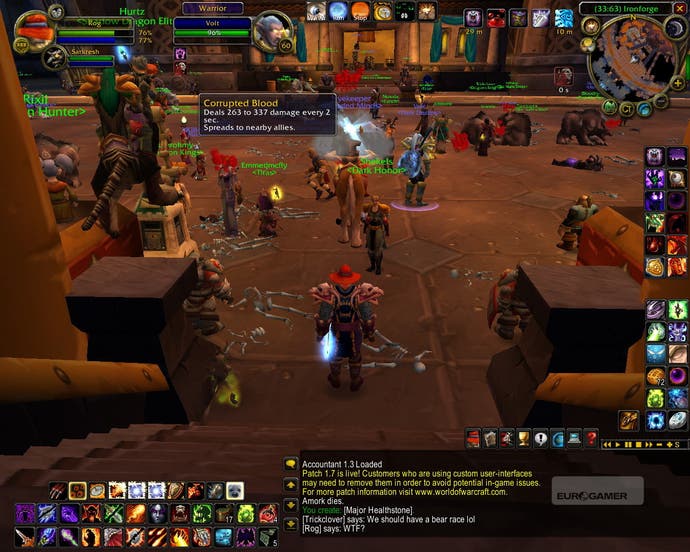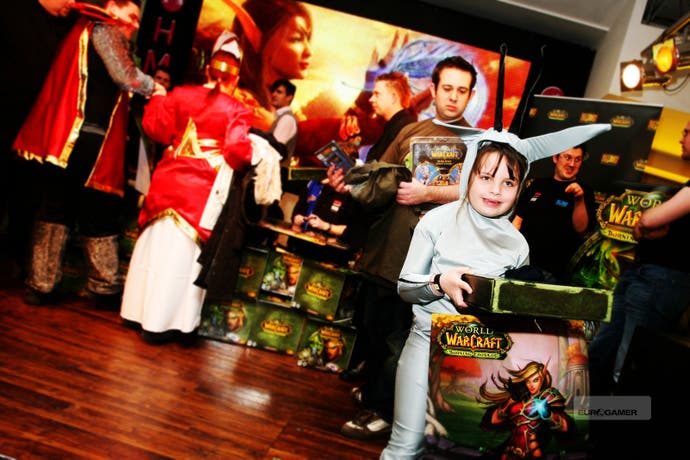The Making of World of Warcraft
Part Two: Five years at the top.
As the game was launched around the world and its audience continued to grow, and as the PvP and raiding endgame continued to take shape, Blizzard started looking to the next giant challenge. An expansion pack was inevitable - but first, there was to be a major change at the top of the WoW team.
Most of the key people on the game were long-time Blizzard staffers, and new blood was being sought to bring a new perspective. That led to the hiring of J. Allen Brack, who is now production director on the game. An MMO veteran, he had been working on Star Wars Galaxies for several years before jumping ship to Blizzard - where he was dropped in at the deep end as the team geared up production on what would be one of its best-loved updates, the stunning level 60 raid dungeon, Naxxramas.
Naxx, as players would quickly dub the dungeon, was the last major content update to the original World of Warcraft. For Brack, it would be a rapid baptism in Blizzard's development philosophy, as he observed the team's comprehensive post-mortem of its previous major content launch - the raid dungeons of Ahn'Qiraj - and its handling of feedback from the player community.
But as the game's audience stretched into the millions, picking through the sheer volume of feedback became difficult. "It's an imperfect process, definitely," Brack admits. "We have a lot of different types of inputs - our community team and what they find on the boards, our customer service team, our cadre of friends who play the game, or players we know well...
"I think the team is actually very good at taking those inputs - hundreds of thousands of them, literally - and coming up with changes to make, things to do and not to do. Could we do a better job? Absolutely - but I think this is something the team is actually very good at."

Chilton, for his part, isn't intimidated by the large community. "If you're trying to use the forums as a good source of ideas, then sure, it's harder to have that big community because you're looking for a very small signal in a lot of noise. But if you're looking for the noise, then it helps, because the the noise for certain topics is so clear and so obvious - you know that this is what people really care about, this is what they're really upset about right now."
The content update cycle for the original World of Warcraft ended with Naxxramas. The team's focus now moved to new territory - the launch of WOW's first expansion pack, The Burning Crusade. The scale of the expansion would dwarf previous updates to the game, providing an entire new continent for players to explore.
"Really, the main thought was just that we definitely wanted to add ten more levels of content," explains Brack. "WOW is a content game, so we were trying to think of the types of content that players want to experience, whether they know that they want to experience it or not."
For Chris Metzen, the expansion represented an opportunity to push the creative boundaries of what World of Warcraft was. In creating a whole new continent - in WOW's mythology, actually the shattered remains of a different planet - the team would be able to create something radically different.

"Burning Crusade was a strong removal from the tones and values of Old World Azeroth," Metzen says. "You had broken, burning, alien landscapes, primordial fungal swampland and giant crystal spaceships - these were definitely far out, comparatively.
"If you had never played [Warcraft II expansion] Beyond the Dark Portal all those years ago, if you knew nothing about those concepts, it was pretty funky, right? Even internally, we went round and round on whether this was the right idea, whether it was too far away from what our players would expect. Just how far can you push away from people's expectations - both our own and those of the players - before you have alienated them?"
In order to keep players involved, improving WOW's storytelling was especially important, says Brack. "Giving players the idea of an overarching story... of these villains and the reason why you're doing this stuff - that's much more present in Burning Crusade than it is in the original game."








